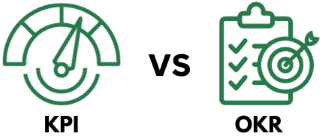KPIs versus OKRs
Are you drowning in a sea of acronyms—KPI, OKR, ROI, CPC, ROAS, MRR? It's a cacophony of letters, a metrics meltdown. How do you make sense of it all? Let me help you navigate two categories of metrics - KPIs and OKRs.

KEY PERFORMANCE INDICATORS (KPIs)
Let's start at the beginning, shall we? Key Performance Indicators (KPIs) are the metrics that monitor the performance of specific aspects of your business. Imagine them as the dashboard of your car, telling you how fast you're going or how much fuel you have left. KPIs measure the tangible outcomes like sales, customer satisfaction, and productivity. Want to know how many products you sold last month? Check the KPIs. Curious about customer satisfaction? The KPIs will have that information too.
But KPIs are not a one-size-fits-all solution. Sales, marketing, customer support — each department has its own set of vital signs. It's about tailoring the KPIs to your business DNA, ensuring they're the true pulse of your operations.
OBJECTIVES AND KEY RESULTS (OKRs)
Now, enter Objectives and Key Results (OKRs), the cool, trendy cousin. OKRs are ambitious, goal-oriented frameworks designed to drive organizational alignment and success. OKRs are the dreamers, the visionaries. They set the stage for the big picture, outlining ambitious objectives that push the boundaries of what's possible. The key results, like the milestones on a road trip, help you track progress toward those lofty goals.
An Objective (O) might be to grow from $75 million to $100 million dollars in revenue. A Key Result (KR) for that particular revenue objective might be quantitative: improve customer retention by 10% while another KR might be qualitative such as: create a roadmap of Sales and Marketing strategies to increase revenue.
HOW ARE KPIs AND OKRs SIMILAR?
A Key Result (KR) in an OKR can be a KPI as Key Results are often metrics that are used to aid in the achievement of the defined goal or objective. If a Key Result (KR) can be quantified, it’s possible it can also be a KPI. OKRs foster collaboration, aligning every department and individual with the overarching objectives but KPIs can provide input to KRs to achieve those objectives. It's a collective effort, a symphony of skills working in harmony to achieve results.
Think of KPIs as a team of players, each with a specific role and responsibility. They are all about performance. OKRs, on the other hand, are the coaches on the sidelines, providing objectives and rallying the team towards a common goal. It might be a bit of a stretch but a comparison could be that Ted Lasso and Coach Beard from the TV Show Ted Lasso help set the O in OKRs while KPIs and maybe even some Key Results (KRs) are the AFC Richmond team players.
If you’re a fan of the TV Show Ted Lasso, you might also find this Medium article interesting called "If Ted Lasso used OKRs".
HOW ARE KPIs AND OKRs DIFFERENT?
One of the most significant distinctions between KPIs and OKRs is in their time horizons. KPIs are often about short-term success, ensuring an organization stays on track day by day. They monitor the current and ongoing health of the business and alert you to any hiccups in the system.
OKRs, on the other hand, have their gaze fixed on the horizon. They're the architects of long-term success, crafting a vision for the future state of the business. As a result, they are often measured less frequently, such as quarterly instead of daily or weekly. They also often have time-bound restrictions because goals and objectives can change from one time period to another.
Another way KPIs and OKRs are different is that Key Results (KRs) do not have to be metrics. It would be a mistake to only have metrics as your KRs. Good KRs can also include qualitative measures such as “design and implement” or “complete research on”. These can be referred to as “effort based” results rather than metrics or “quantifiable” results.
FINAL THOUGHTS
Congratulations! You now know the definition of KPI and OKR as well as how they are similar and different. As you begin or continue your own business adventure, remember this: KPIs keep you grounded in the present – your day-to-day compass – ensuring daily operations run like a well-oiled machine. OKRs have their sights set on the future – your North Star – and propel you toward greatness by fostering innovation and ambition.
In the dynamic world of business, it's not about choosing between KPIs and OKRs but rather embracing the power of both. Like peanut butter and jelly, Mario and Luigi, Captain Kirk and Mr. Spock, they're better together than apart.
Armed with this newfound knowledge, go forth and conquer the metrics maze!
